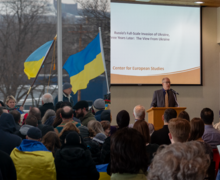Life behind the scenes
As the private Warner Bros. jet loomed over the runway, Tula Goenka looked out the window. Below her, she saw fire. Rows and rows of fire. Whole streets engulfed in flame. Once on the runway, she and her five companions loaded into a black limousine and proceeded to drive into the heart of Los Angeles.
It was 1992 and the verdict in the Rodney King trial had just been announced.
As they drove toward their hotel – the celebrity-filled Chateau Marmont – those in the limo watched on a small TV what was going on right outside their windows. Entire neighborhoods torched, stores battered and broken into, citizens beaten and arrested.
The limo maneuvered through the chaotic L.A. streets, while in the back of the car sat 10 large cans containing $35 million in film that, when pieced together by Goenka, was Spike Lee’s four-hour-long ‘Malcolm X.’
And while Tula Goenka, now a television, radio and film professor at the S.I. Newhouse School of Public Communications, was watching people trudge out of candy stores carrying stacks of stolen Godiva chocolates, she was thinking only of what they would tell their children. Of how they would explain boxes and boxes of looted chocolate.
Fifteen years later, she is still fascinated by human behavior.
And it is the stories she crafts from human behavior that have been the basis of the feature films, award-winning documentaries and continent-spanning philanthropy work throughout her career.
Parts of Goenka’s films can be seen this week in the Human Rights Film Festival, which she helped bring to Syracuse five years ago. The festival, running from Oct. 4-6, is showing documentaries from around the world, highlighting civil liberties and justice -the yearlong theme of Newhouse.
‘Through film, you can realize the complexities of human life and reality,’ Goenka said. ‘You can appreciate others’ lives. When I watch a violent movie – an action movie – I am always wondering how a human being can transform to become so violent. I wonder what goes on in their head.’
Currently, Goenka works with upperclassmen and graduate students at SU, teaching them the basics of film equipment, editing and writing. Teaching them to tell stories.
‘Tula is intense. She is intensely devoted to her students and their work,’ said Pat Longstaff, a fellow television, radio and film professor in an e-mail. ‘She is intensely devoted to the film festival she organizes every year. She is intensely interested in the fairness of how we operate in Newhouse.’
Transformation is something that Goenka is quite familiar with herself. Born in Calcutta, India, her family moved often throughout the country. With each move, she took the opportunity to reinvent herself.
‘I looked at it as chances to change myself, try out different skins,’ Goenka said.
Goenka grew up without television. She relied on her own imagination and movies, both Indian and Western, for entertainment. Her favorites were ‘The Sound of Music,’ ‘Doctor Zhivago’ and Hindi film ‘Jab Jab Phool Khile.’
After attending an all-girl boarding school for three years, Goenka’s family moved again – this time to Madras – where she received a degree in sociology from the local university. Goenka then spent a year in Bombay, taking journalism courses and graduated with a degree in mass communications.
She soon realized though if she were to be a journalist, she would have to write in English. But, at that time in India, only about two percent of the population would have understood.
‘Movies though,’ she said, ‘were a visual medium. Everyone understood those.’
And so began her passion for film, though it would be a few years before her first big project.
After spending a year at an advertising firm in India, where she was telling ‘big shot ad directors’ to increase the condensation on pop cans, Goenka applied to Syracuse in 1984, a school a Bombay college professor had attended and told her about.
A few months later, Goenka was walking into her first TRF class in Newhouse, completely overwhelmed.
‘I had no idea what I was doing,’ she said. ‘Within a day though, I had made friends. I learned so much, and my professors who taught me then are now my colleagues.’
One of those people is Richard Breyer, a television, radio and film professor, who taught Goenka in grad school and is now one of her close friends.
‘She’s a compassionate teacher, part of a team of compassionate teachers,’ Breyer said. ‘She is disciplined, professional and she has always had good sense of story, fiction and non-fiction.’
It was Goenka’s story that was told during her final months as a Syracuse graduate student when her first film – ‘Nights of our Lives’ – was shown on local TV. In six months, she had written, cast, produced, directed, scored and edited the half-hour long film, and only two months later received her master’s in Television, Radio and Film.
The road since then has been one of luck, timing and talent.
‘I have seemed to always be lucky to be in the right place,’ Goenka said. ‘I have worked hard to maintain contacts, who then take me to the next level. Talent is important, but it’s also lots of luck. I have been blessed most of the time.’
The next levels for Goenka included spending a year spent in New York City working at MTV Networks, particularly with the developing Nickelodeon channel. As a production assistant, Goenka was on the team that developed the famous ‘Double Dare’ green slime for its first promo.
That same year, she met now close friend and Indian director Mira Nair while working as a Hindi translator and assistant editor for two internationally-acclaimed Indian films ‘Children of Desired Sex’ and ‘Salaam Bombay.’
Following that came another blessed moment – a meeting with American director Spike Lee for work on ‘Do the Right Thing.’ She edited the film through the hot Brooklyn summer of 1988 and learned the art of film.
‘I remember sitting in the editing room with Spike and the producers, hearing discussions of what shots were going to be cut,’ Goenka said. ‘I learned so much that summer about cultures I wasn’t exposed to growing up – both in the film industry and about New York City.’
Because of her work on that film, Goenka was offered the job of first assistant editor of the controversial ‘Malcolm X.’ And while she had previously laughed about her famous friends being on Indian magazine covers, it was this film that would command front-page status.
That would lead her into the heart of the 1992 Los Angeles riots. That would allow her to help tell the story of an American legend.
‘I had heard his name and understood that he was something of a martyr,’ Goenka said about the history of Malcolm X. ‘I had always wondered what the world would be like today with people like him and Martin Luther King alive. They would be great leaders. … I was being held responsible for Malcolm X’s movie and really thought it would make a difference.’
Goenka remembers the screening of the movie in Los Angeles – after having driven through the racially-instigated riots to get to the Warner Bros. studio – as one of the most profound in her life.
‘It was so strange watching him on the screen and knowing what was going on outside of the building with the race riots,’ Goenka said. ‘It was real and true. What he had said 30 years ago about race relations was still the same in 1992. It was no different.’
And that is what Goenka is trying to change.
Around the time of the ‘Malcolm X’ release, Goenka and several friends founded Sakhi, an international organization committed to ending domestic abuse and violence against women, specifically in Southeast Asia. Sakhi, which is Hindi for ‘woman friend,’ overtook Goenka’s life.
‘Us five women and co-founders were incredibly involved,’ she said. ‘We had to learn how to be advocates for women and to change their perceptions of themselves. It’s really made a difference.’
After years of organizing and promoting anti-violence festivals film screenings and educational events, along with maintaining steady TV and film editing work, Goenka was proud to take a backseat with the organization, as Sakhi was strong enough then to function on its own.
And she needed the break, as her own life story began to shift.
Goenka was offered a job as an assistant television, radio and film professor in 1998, and she moved to campus that summer.
‘Teaching had never been in my radar, but thought, ‘Why not?” Goenka said. ‘It taught me more about what I do. I had to articulate why I did certain things and think about why. Filmmaking is my love, and I love being able to share that passion.’
The reputation she gained as the classroom – Breyer described her as a ‘leader’ and an ‘immense help’ – earned her tenure in Dec. 2005, after six years of reviews, meetings and evaluations.
But only months later – in March 2006 – another surprise. After a routine mammogram, doctors found a 1 cm lump in her breast. After the cancer had spread, Goenka underwent chemotherapy, and endured a double mastectomy.
Goenka had reconstructive surgery, but it, along with her checkups and five years of anti-cancer medication are ongoing. Today, she has ‘mellowed out’ and knows what’s important. That life is short and graciousness and kindness are key in life.
That’s why she is so passionate about this week’s Human Rights Film Festival, which she helped to organize five years ago with an organization called Breakthrough.
‘It’s really very important to showcase activist filmmaking from across the world,’ Goenka said. ‘It’s crucial for Syracuse students to be aware of world issues. Classes teach those things, but you can actually see them in the movies. It’s real. You can see the complexities of human life and human stories.’
Published on October 1, 2007 at 12:00 pm





